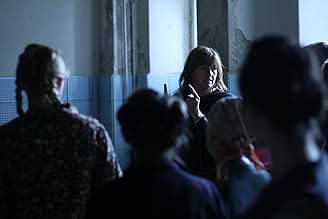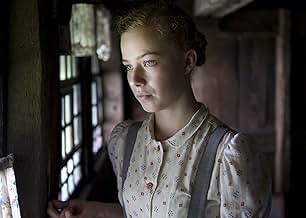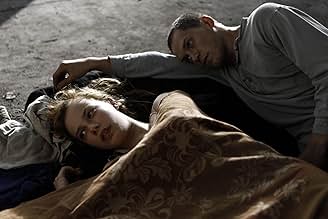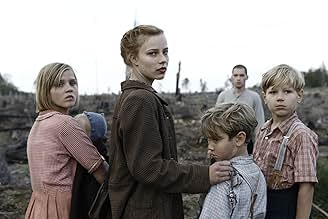AVALIAÇÃO DA IMDb
7,1/10
16 mil
SUA AVALIAÇÃO
Enquanto os Aliados percorrem a Alemanha, Lore leva seus irmãos numa viagem que os expõe à verdade das crenças de seus pais. Um encontro com um misterioso refugiado força Lore a confiar em u... Ler tudoEnquanto os Aliados percorrem a Alemanha, Lore leva seus irmãos numa viagem que os expõe à verdade das crenças de seus pais. Um encontro com um misterioso refugiado força Lore a confiar em uma pessoa que sempre lhe foi ensinada a odiar.Enquanto os Aliados percorrem a Alemanha, Lore leva seus irmãos numa viagem que os expõe à verdade das crenças de seus pais. Um encontro com um misterioso refugiado força Lore a confiar em uma pessoa que sempre lhe foi ensinada a odiar.
- Direção
- Roteiristas
- Artistas
- Prêmios
- 34 vitórias e 34 indicações no total
Kai-Peter Malina
- Thomas
- (as Kai Malina)
Nick Holaschke
- Baby Peter
- (as Nick Leander Holaschke)
Claudia Geisler-Bading
- Ox Cart Woman
- (as Claudia Geisler)
Hanne B. Wolharn
- School House Woman 3
- (as Hanne Wolharn)
- Direção
- Roteiristas
- Elenco e equipe completos
- Produção, bilheteria e muito mais no IMDbPro
Avaliações em destaque
I won't add to the reviews already written, but I want to comment on how this film moved me personally. I saw this film at the Vancouver International Film Festival and rated it "Excellent" for its stunning visual accomplishments, superb acting, its continuous suspense and mystery, and for the moral challenges it presents through its storyline. This is a film that will stay with you a long time after you have left the theater, even if your parents did not live through this era in Europe (as mine did). The film touches on so many human elements -some very conflicting- ranging from hope, compelling compassion, and the draw of sexuality, to revenge, murder and hatred. It brilliantly blends the social and the individual with it's backdrop of the socio-historical landscape of Germany right at the end of World War Two and how the power of that situation impacts on the lives of its protagonists. If ever there was an artful illustration of how one generation is affected by the actions or inactions of a previous generation, Lore excels in demonstrating that.
Director/writer Cate Shortland has created something truly remarkable, forcing us to find within ourselves sympathy for a young Nazi. The story is grim and dense, but features one hell of a lead performance. Shortland combines wonderful visuals with a brutal story of survival, involving family and patriotism, and a running commentary on the state of Germany after the fall of the Third Reich.
As the German army collapses in the spring of 1945, the breakdown of a family serves as a microcosm of a country in despair in the closing days of World War II. Lore (Saskia Rosendahl) and her four younger siblings are abandoned as their Nazi- supporting parents are forced to flee the Allied forces. As they travel on foot to their grandmother's house in Hamburg, the children encounter a young Jewish refuge, Thomas, on whom they are forced to rely for both food and safe passage through Ally-occupied lands. As she is exposed to the lies of their parents, and begins to develop feelings for one whom she has been taught to hate, Lore is forced to come to terms with a belief system that is quickly unraveling.
It's the children that have to do all the heavy lifting in the film dramatically, and they carry their weight, and then some. The film is anchored by a remarkable lead performance from Rosendahl, who comes across as a seasoned veteran, despite this being her debut performance. Her character goes from obnoxious adolescent to young adult, via a series of confronting moments where her morals and beliefs are challenged. Her vibrant youthful spirit is replaced with a burning rage with a war torn Europe as the backdrop.
A new perspective on an event often forces an audience to confront disturbing realities they may wish to avoid. Although "Lore" relates a story from the second world war, it reveals the point of view of those we do not often consider: children of a high-ranking Nazi official. This story may not be pleasant, but it is certainly fascinating.
As the German army collapses in the spring of 1945, the breakdown of a family serves as a microcosm of a country in despair in the closing days of World War II. Lore (Saskia Rosendahl) and her four younger siblings are abandoned as their Nazi- supporting parents are forced to flee the Allied forces. As they travel on foot to their grandmother's house in Hamburg, the children encounter a young Jewish refuge, Thomas, on whom they are forced to rely for both food and safe passage through Ally-occupied lands. As she is exposed to the lies of their parents, and begins to develop feelings for one whom she has been taught to hate, Lore is forced to come to terms with a belief system that is quickly unraveling.
It's the children that have to do all the heavy lifting in the film dramatically, and they carry their weight, and then some. The film is anchored by a remarkable lead performance from Rosendahl, who comes across as a seasoned veteran, despite this being her debut performance. Her character goes from obnoxious adolescent to young adult, via a series of confronting moments where her morals and beliefs are challenged. Her vibrant youthful spirit is replaced with a burning rage with a war torn Europe as the backdrop.
A new perspective on an event often forces an audience to confront disturbing realities they may wish to avoid. Although "Lore" relates a story from the second world war, it reveals the point of view of those we do not often consider: children of a high-ranking Nazi official. This story may not be pleasant, but it is certainly fascinating.
Lore (2012)
A gorgeous, depressing, rare film about a family of Germans who need to survive the chaos and poverty of the end of World War II. This is a really terrific movie even though it has a single, basic, ongoing, sad arc--moving from place to place in search of food and safety as the Allies, mostly unseen, take over administration of the country in 1945. What it manages to say is not just that war is bad, or that people have the ability to survive anything if they must, but that beliefs and politics are stubborn and irrational.
It's this last part that comes through it all as the shining purpose. It's one thing for this band of children to beg for food or walk though forests weary and assaulted by marauders. But to have them run into others who, like themselves, don't know where to turn or what is going on, and still have a devotion bordering on worship for the fuhrer is mind blowing. But believable.
The filming--scenes, light, color, moving camera, and the sheer range of all of these from scene to scene--is stunning, absolutely terrific. As you might grow weary of all the weariness, you never grow weary of the movie because it's so rich in other ways. And it's never dull, either, as characters come and go and their motivations turn on a dime. How it ends, both literally and emotionally, will stay a surprise, and yet when it happens it makes such perfect sad undramatic sense.
There are all kinds of war movies, and this is an important insight into one of the least explored aspects to it all--the terrible aftermath. It's an Australian production, mainly, shot in Germany in German. And it's a really special, thoughtful, beautiful film.
A gorgeous, depressing, rare film about a family of Germans who need to survive the chaos and poverty of the end of World War II. This is a really terrific movie even though it has a single, basic, ongoing, sad arc--moving from place to place in search of food and safety as the Allies, mostly unseen, take over administration of the country in 1945. What it manages to say is not just that war is bad, or that people have the ability to survive anything if they must, but that beliefs and politics are stubborn and irrational.
It's this last part that comes through it all as the shining purpose. It's one thing for this band of children to beg for food or walk though forests weary and assaulted by marauders. But to have them run into others who, like themselves, don't know where to turn or what is going on, and still have a devotion bordering on worship for the fuhrer is mind blowing. But believable.
The filming--scenes, light, color, moving camera, and the sheer range of all of these from scene to scene--is stunning, absolutely terrific. As you might grow weary of all the weariness, you never grow weary of the movie because it's so rich in other ways. And it's never dull, either, as characters come and go and their motivations turn on a dime. How it ends, both literally and emotionally, will stay a surprise, and yet when it happens it makes such perfect sad undramatic sense.
There are all kinds of war movies, and this is an important insight into one of the least explored aspects to it all--the terrible aftermath. It's an Australian production, mainly, shot in Germany in German. And it's a really special, thoughtful, beautiful film.
I just saw this film at the Camera Cinema Club in San Jose. This is an immensely complicated film about the children of an SS officer and war criminal. The father disappears. The mother gives herself over to the Americans, and the children (aged 15 down to 7 months) are left to fend for themselves and make a 500km trip to their grandmother's in Hamburg. Germany is in ruins. People are starving and sick. They deny the Holocaust and mourn their dead leader who committed suicide in a bunker. Throughout it all, the 15-year-old lead character Lore must somehow get her siblings to grandma's house while slogging through the chaos of the failed Third Reich.
As I said, it's immensely complicated. It feels like a slice of life even if it is fiction. The cinematography is excellent. The lead actress, all of 19 in real life, is obviously very talented. I gave the film a 7 out of 10 because it's a bit too disjointed for my tastes, but perhaps that's an effective way to portray Germany's disarray at the end of the war.
As I said, it's immensely complicated. It feels like a slice of life even if it is fiction. The cinematography is excellent. The lead actress, all of 19 in real life, is obviously very talented. I gave the film a 7 out of 10 because it's a bit too disjointed for my tastes, but perhaps that's an effective way to portray Germany's disarray at the end of the war.
Set in Germany at the end of the Second World War, this film takes up where others like Downfall leave off and asks questions about how the erstwhile beneficiaries of Nazi rule cope with their new world. The film tracks the journey of five innocents as their life of privilege collapses and they are forced to come to terms with the effects of dreadful events over which they had no control but to which they have given their tacit support.
Four of these children are really too young to bear any culpability. Only the oldest, Lore, is really capable of comprehension and it is through her eyes that the film is focused, as she slowly realises just how much her parents are implicated in the horrors of the Nazi regime, and, as an extension of this, herself and the whole German people. Lore is helped to this realisation by Thomas, a Jew who appears to have been liberated from a concentration camp. But Thomas also has a psychological burden and may not be all he appears.
This is another fine film from Cate Shortland, someone who surely should be making more films more often.
Four of these children are really too young to bear any culpability. Only the oldest, Lore, is really capable of comprehension and it is through her eyes that the film is focused, as she slowly realises just how much her parents are implicated in the horrors of the Nazi regime, and, as an extension of this, herself and the whole German people. Lore is helped to this realisation by Thomas, a Jew who appears to have been liberated from a concentration camp. But Thomas also has a psychological burden and may not be all he appears.
This is another fine film from Cate Shortland, someone who surely should be making more films more often.
Você sabia?
- CuriosidadesThe family photographs in the wallet that Lore looks at are pictures of director Cate Shortland's husband's family.
- Erros de gravaçãoThe derelict tank the children pass in the forest is a post-WW2 manufactured Russian T-54/55 or T-62 tank. The balk cross painted on the turret is indicative of an early war paint scheme. Later in the war the 'lines' were thicker.
- ConexõesFeatured in Film '72: Episode dated 13 February 2013 (2013)
- Trilhas sonorasJugend will marschieren
(Alte Aufnahme)
Folksong
Arranged by Lisa Carlyna Zumpano (ASCAP)
Published by Audiosparx (ASCAP)
Principais escolhas
Faça login para avaliar e ver a lista de recomendações personalizadas
- How long is Lore?Fornecido pela Alexa
Detalhes
Bilheteria
- Orçamento
- € 4.300.000 (estimativa)
- Faturamento bruto nos EUA e Canadá
- US$ 970.325
- Fim de semana de estreia nos EUA e Canadá
- US$ 31.498
- 10 de fev. de 2013
- Faturamento bruto mundial
- US$ 2.362.019
- Tempo de duração1 hora 49 minutos
- Cor
- Mixagem de som
- Proporção
- 1.85 : 1
Contribua para esta página
Sugerir uma alteração ou adicionar conteúdo ausente





























